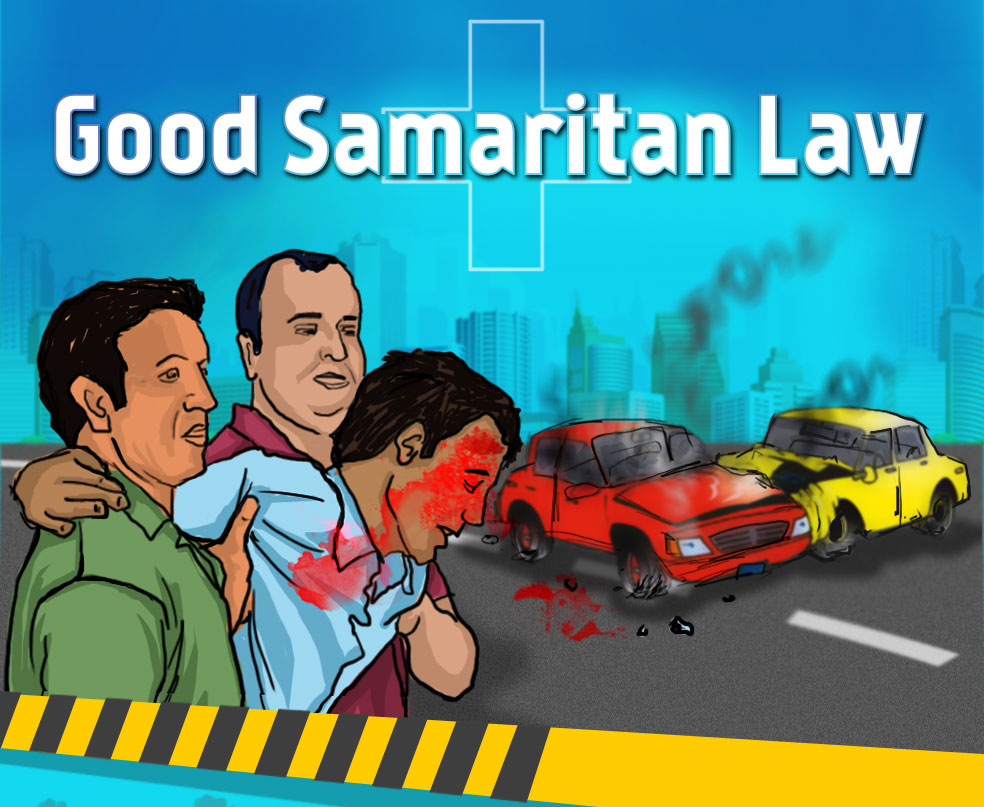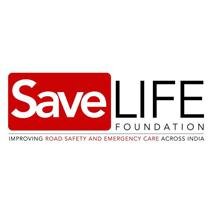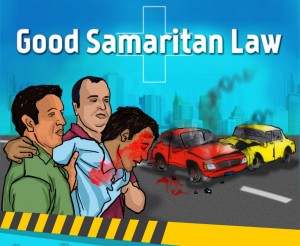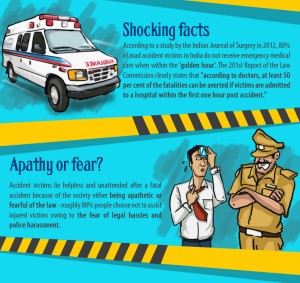In this blog post, Pramit Bhattacharya, a student of Damodaram Sanjivayya National Law University writes about how the Apex Court has made it easier for the “Good Samaritan” to help the victims of road accidents. The timeline of the developments has been highlighted in the post. The guidelines given by the government has also been discussed in the post.
There are two very crucial questions regarding this issue. The first and the foremost is the high number of accidents that occur on roads in India. Every day around 350 people die in road accidents and crashes. Most of the victims suffer due to causes which can be prevented if the general populace puts in a bit of effort. These factors include accidents due to overloading, speeding, driving on the wrong side, drink driving, etc.[1] The second question with regards to the issue is that why are people not willing to help the road accident victims? Almost 75-80 % of the population are very hesitant when it comes to helping victims of road victims. This hesitancy is a mental belief in the minds of the public that even if they do a good deed, they will be involved in legal hassles, they’ll face police harassment, they’ll be detained in the hospitals and the police stations for a long time, and they would be called to the Court of law again and again. These were the finding of an NGO which goes by the name of SaveLIFE Foundation. This foundation is a non-governmental, non-profit and independent organization and their main aim is to bring improvement in road safety and emergency care.[2] The Law Commission of India also observed in its 201st Report that almost 50 % of the deaths could have been prevented had the victims got timely help from the bystanders.[3] Not only the Law Commission but the World Health Organization is also of the opinion that empowered and skilled bystanders play a very crucial role in saving the lives of the victims. The WHO also opined that the bystanders should come forward and help the victims as much as they can, and for them to come forward voluntarily without any hesitation, it is extremely important that an ethical environment and a supportive legal structure is present, where such bystanders wouldn’t be harassed.[4]
Keeping this in mind, the SaveLIFE Foundation filed a PIL.[5] They conducted a study on the national level and by it the foundation submitted a report to the Court which stated that three out of four people are not willing to help victims of road accidents. The report also stated that 88 % of people were hesitant because of the long and complicated legal formalities.[6]
Timeline of the Developments
The PIL was filed by the Foundation in the year 2012. The PIL was filed with the aim of having a proper legal setup and guidelines in place which would protect the people who help road accident victims from unnecessary intimidation and harassment. The PIL also aimed at having efficient and proper trauma services across the nation. In furtherance of this PIL, the Apex Court in October 2013 appointed a three-member committee under the guidance of former Judge K. S. Radhakrishnan. The committee also comprised of scientist Nishi Mittal and former Secretary of Road Transport Ministry, S. Sundar. The Committee had to study the issues mentioned in the PIL and file a detailed report to the Court. The recommendations which were made by the Committee were also strongly supported by the Ministry of Road Transport and Highways through an affidavit in October 2014. Based on this, the Supreme Court directed the Ministry of Road Transport and Highways and Ministry of Law and Justice to issue such directions which were necessary to protect the people who help road accident victims, until a proper law was enacted by the legislature about this issue. In May 2015, the Ministry of Road Transport and Highways notified the guidelines.[7] The guidelines stated that disclosure of the identity of a person who helps an accident victim is voluntary. The guidelines also stated that such a person wouldn’t be liable for any criminal or civil liability. Furthermore, on January 2016, the Government also issued the Standard Operating Procedures to protect Good Samaritans from police harassment. These procedures included the examination of a person during a trial or by the police.[8] The problem with these guidelines was that they had no legal backing at all. They were just advisory in nature. It was difficult to implement the guidelines without any legal backing. There was still a fear among the people that these guidelines could well be violated by the authorities. But on 4th of March, 2016, the Apex Court at the hearing of the petition stated that the guidelines given by the Ministries would be binding throughout the country. On 30th of March 2016, the guidelines which were issued by the Centre was approved by the Supreme Court.
A Vital Step
The judgment given by the Apex court is very significant because now it is as good as a law. If any party does not comply with the guidelines, it’ll be treated as the contempt of the Apex Court. Before the judgment was passed by the Supreme Court, these guidelines were merely advisory in nature and the authorities were not bound to follow the guidelines. After the judgment has been passed, these guidelines have become reliable for the people to bank upon. The Central and the State Governments now has the responsibility to implement these guidelines in efficient manners so that it can be helpful to the good Samaritans. Although these guidelines will act as interim measures till a proper law is made, this is still a very vital step to protect the interest of the people who help the victims of road victims.
The Guidelines[9]
- Any person who takes a victim of a road accident to a hospital can leave the hospital immediately without being asked any questions. Such people cannot be compelled to stay until and unless they are there in the capacity of an eye witness too. In such a case also only their residential address can be noted without being forced to stay.
- Any person who has helped a victim of a road accident may also be awarded by the concerned State Government. This is to ensure that their efforts are appreciated, and other such people are also encouraged to help those in need.
- A bystander who helps a road accident victim be not held liable for any civil or criminal matter.
- When a Good Samaritan calls any emergency service or the police to the place where the accident has taken place, it is not necessary for him/ her to reveal the name or for that matter any such personal information.
- It is also optional for such person to fill his or her personal details in the medico-legal form which is provided by the hospital.
- Those officials or authorities who force any person to reveal their personal details or identity will face departmental and disciplinary actions.
- When the bystanders voluntarily state that he or she was an eyewitness to the accident, then he/she can be examined by the police as a part of the investigation or be questioned in a trial. But this examination or questioning can be done only once, and the Standard Operating Procedure should be followed, so the person is not harassed again and again.
- The examination which is being done should be carried out only under Section 284 of the CrPC[10] or through an affidavit under Section 296 of the CrPC.[11]
- The witnesses can also be examined through video conferencing to make the procedure speedier and save them from any inconvenience.
- These guidelines also direct the Ministry of Health and Family Welfare to issue further guidelines which bar private and public hospitals to detain the helper or ask them to pay the registration or the admission cost until and unless such a bystander is the family member of the victim who needs immediate treatment.
- If any doctor fails to provide aid to the victim of a road accident when he has the duty to help the victim, it would be considered as “Professional Misconduct” which has been prescribed by the Indian Medical Council Regulations 2002, and appropriate action will be taken against such doctor.
- All hospitals are required to put up a notice in English, Hindi, and the regional language of the particular State or the Union Territory and the notice will clearly state that no helping bystander is required to pay any money or furnish his or her personal details.
- If the bystander requires an acknowledgment on the part of the authorities or the hospital that the victim was brought by him or her to the hospital, the authorities or the hospital are duty bound to prepare and furnish an acknowledgment document as per the procedures laid down.
- All the hospitals, whether private or public need to implement these guidelines as soon as it is practicable. If the guidelines are not implemented within a reasonable time, action will be taken against such hospitals.
Concluding Remarks
Although people are hesitant to help the victims of a road accident, the introduction of these guidelines will act as a barrier against the harassment and inconvenience these people face. The helpers will also be encouraged by the incentive which is being provided to them for their kind act. A supportive framework like this will also reduce the number of death which happens due to road accidents and crashes, as people would be more willing to help the victims now.
Footnotes:
[1]http://scroll.in/article/757365/road-accidents-kill-382-in-india-every-day-1682-times-more-than-terrorism
[2]http://savelifefoundation.org/wp-content/themes/savelife/documents/SaveLIFE%20Report-Impediments%20to%20Bystander%20Care.pdf
[3]http://lawcommissionofindia.nic.in/reports/rep201.pdf
[4]http://apps.who.int/iris/bitstream/10665/43167/1/924159294X.pdf
[5] Writ Petition (Civil) No. 235/2012
[6]http://thewire.in/2016/03/30/sc-guidelines-now-protect-good-samaritans-who-help-road-accident-victims-26680/ ; supra 2.
[7]http://egazette.nic.in/WriteReadData/2015/164095.pdf
[8]https://savelifefoundation.org/wp-content/themes/savelife/Documents/GazetteNotification_SOPforGS.pdf
[9]http://www.jaagore.com/articles/know-your-police/helping-road-accident-victims-without-any-consequences
[10] When attendance of witness may be dispensed with and the commission issued
[11] Evidence of formal character on affidavit
 Serato DJ Crack 2025Serato DJ PRO Crack
Serato DJ Crack 2025Serato DJ PRO Crack













 Allow notifications
Allow notifications


